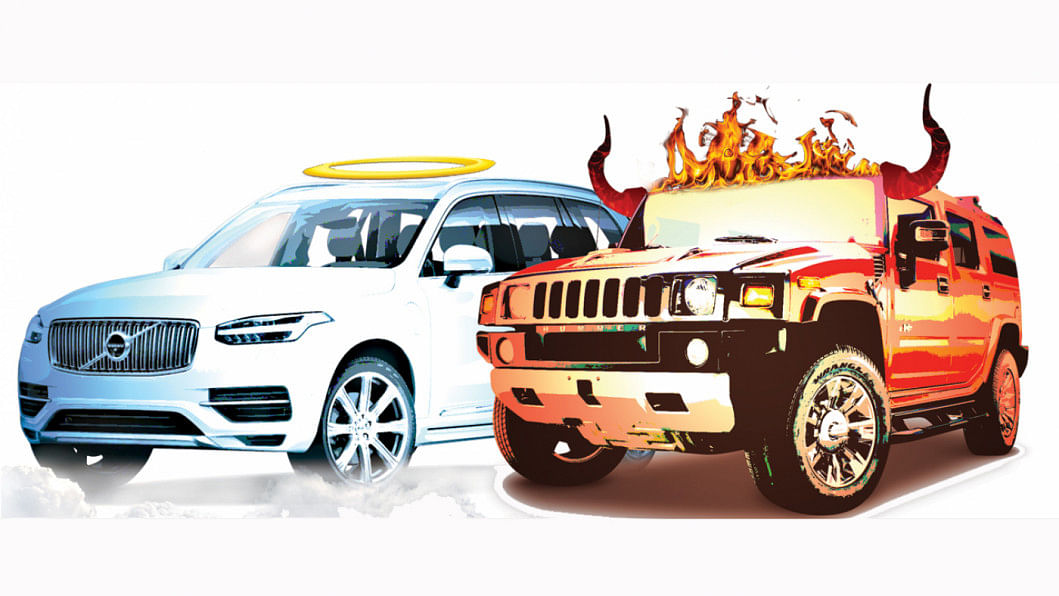Political correctness and the changing face of the auto industry

At a press gathering in the commercial building of AM General in November 1992, Arnold Schwarzenegger got in and drove off with a beige Humvee, a road going behemoth as wide as a full size 18 wheeler lorry, half as tall with a 6.2 litre diesel engine that drank as much fuel as a tank. It was the road going version of a vehicle that was as much a celebrity as the Terminator himself – Operation Desert Storm and the 1991 liberation of Kuwait from Iraq by coalition forces propelled the HMMWV tactical assault vehicle to infamy, at a time when wars were the bomb and everyone was interested in it.
Arnold Schwarzenegger campaigned extensively to get the HMMWV into production, and in 1992 the M998 Humvee officially went into production and was made available to the general public as a civilian vehicle, complete with air-conditioning and padded seats. After a 7 year long production run, General Motors acquired the rights to manufacture and sell Hummer vehicles, with two subsequent models, the smaller and softer (!) H2 and the H3, released to the public.
Like Arnold's career as an actor, a changing political and social landscape would force significant changes to the kind of cars that would survive in a competitive market. Arnold's muscle toned action-hero would be replaced with the quietly confident and politically correct Jesse Eisenberg, the brute of a Hummer would be usurped by hybrid soft-roaders and electric Teslas.
For the past decade or so, political correctness has shaped the entire car industry in every way imaginable. The drivetrain powering even the biggest of SUVs such as the Volvo XC90 are now highly efficient and sip as little fuel as possible, cows are murdered less for leather interiors such as in BMWs (thanks to a material called Sensatec), and wood trim has almost entirely disappeared other than in the most atmospheric of Rolls Royce vehicles. Luxury no longer means damaging the environment irreparably, economy no longer means owners are at the bottom of the social ladder – political correctness has placed small displacement hatchbacks and highly efficient, low emission vehicles at the top, making you more in tune with the times than Snapchat filters and numerous Instagram hashtags.
How did political correctness come to be associated with the car industry?
As it did with the hyper-masculine stamp of approval placed on the poster-child of manliness that is the Hummer, it all started with celebrity endorsements. In the mid-2000s, following a wave of environmental consciousness fueled by Al Gore, carbon consciousness and knowledge of the effect of driving petrol cars reached new heights as countless celebrities publicly joined the cause of environmental conservation. Starry eyed environment studies, political science and anthropology majors in left leaning liberal arts colleges in the US might disagree with who spoke of the damage caused by fossil fuels first, but it is well established that a cause does not get traction with a mass audience till a celebrity picks it up. 16 years after Al Gore made combatting global warming a presidential campaign mandate against George W. Bush, it is celebrities like Leonardo DiCaprio who carry on the battle against climate change. The Toyota Prius and more recently the Tesla vehicle range are the weapons these celebrities wield – in a celeb obsessed world, what they drive is what others want to drive, practically for the same reasons.
The world's roads may not be overflowing with Teslas and hybrid Priuses or hydrogen fuel cell Mirais, but the lean towards more efficient cars has created a public consciousness that has at least rid the world of obnoxiously thirsty, needlessly large and hilariously over the top cars like the Hummer. The Hummer brand is now defunct, and total sales of the off-roader are thankfully some of the worst ever in 17 years of operation for any brand. Even Arnold Schwarzenegger, once proud endorser of the Hummer, has resorted to converting his H1 Aplha wagon to run on vegetable oil, lest someone points out the hypocrisy of the Governator in imposing ultra-strict smog laws in California while going to lunch in the most distasteful off-roader ever made.
Even off-roaders and Sport Utility Vehicles, the focal point of the hatred of environmentalists worldwide, are now highly efficient and softer on the planet. Covered in angel dust and riding on clouds of 20 inch wheels, the Volvo XC90 is currently the most highly awarded SUV ever. The XC90 range has Volvo's Drive-E powertrains, with petrol and diesel motors, and more importantly a petrol plug-in hybrid variant with the T8 Twin Engine model. Combined with the electric motors, the T8 Twin Engine's drivetrain produces 410 HP yet, where it counts, the XC90 produces only 49 g/km of CO2, making it one of the lowest emission SUVs on the planet. It'll seat seven people comfortably, comes with the largest selection of safety features in any SUV ever so the passengers are always in a cocoon of safety, has Pilot Assist (a semi autonomous driving feature) and even has a feature called Large Animal Detection, so the large SUV can avoid collisions with large animals on highways. With all of these safety features, Volvo is not only looking to lower the carbon footprint of their vehicles, they're also trying to actively keep the fragile ecosystem of this planet in balance.
It might seem counter-intuitive to shower such praise on a car that still relies heavily on fossil fuels, but the argument that electric cars are the future is still highly flawed – the charging points that Tesla and other plug-in electrics use are still fed by the single most hated material on the planet – coal. Coal fired power plants provide most of the electricity to the planet, and no matter how clean the cars are, if they rely on coal power to charge up, they're damaging the environment nonetheless. While the electric car industry and mainstream manufacturers' foray into alternative fuels (most worthwhile pursuits being in the hydrogen fuel cell ring) are ongoing, the car industry must turn to more cars like the Volvo XC90 – providing a buffer till alternatives become mainstream.
Political correctness is a term hated by many, specially in the last few years, the term has had such negative connotations to it that the internet erupts in a frenzy of trolls and keyboard mashing to stomp down on any hint of political correctness. Even if political correctness limits your ability to express your true self (maybe you really, badly, want a Hummer to show everyone what a man you are), when it comes to fighting for your future generation's ability to breathe clean air, it's probably worthwhile to adapt to changing social norms.

 For all latest news, follow The Daily Star's Google News channel.
For all latest news, follow The Daily Star's Google News channel. 



Comments